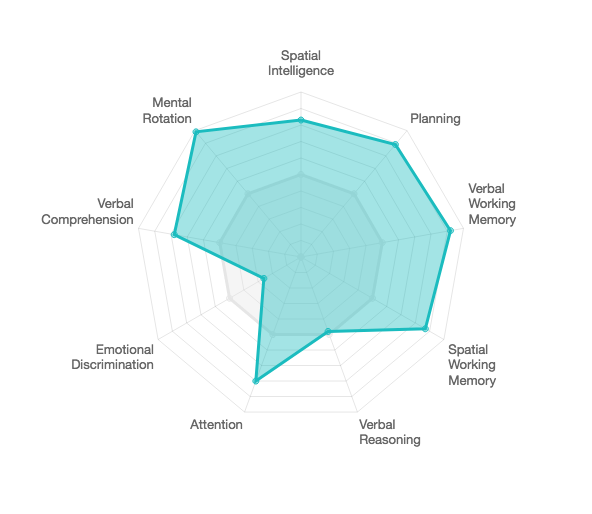Grey matter
This reminded me of the tests we did in primary school in New Zealand at the start of the year to see which level we went into for maths and English. This was at the end of the 1970s. I used to enjoy the tests because we never prepared for them and so didn't have time to worry about them beforehand.
So to start the year I had a go at this intelligence test set up by BBC Horizon and Dr Adam Hampshire at Imperial College, London, and below is a diagram of my overall result. The web is the general population, the thick grey circle is the average (50% of the population). So 'Mental Rotation' is in the top 5% and 'Emotional Discrimination' is in the bottom 50%.
It will be interesting to see the results of this project, particularly how changes in society such levels of stress, or the increasing use of smartphones etc., affect our brains. Will those of us who used old dial telephones have better memories for number sequences? Will GPS reduce spatial memory?
I've also been thinking about my own learning style recently, both with new languages and studying the piano. How does a phrase or a melody become a natural sequence you can draw on at will? I love that moment when, having practised a piece over and over with the sheet music, I can play it with my eyes closed and the piece is pretty much all there without me thinking of where each finger has to go, but actually memorising the piece takes me a lot longer.
You can find out more and do the test on BBC News: Take the Great British Intelligence Test: How clever are you?.
So to start the year I had a go at this intelligence test set up by BBC Horizon and Dr Adam Hampshire at Imperial College, London, and below is a diagram of my overall result. The web is the general population, the thick grey circle is the average (50% of the population). So 'Mental Rotation' is in the top 5% and 'Emotional Discrimination' is in the bottom 50%.
It will be interesting to see the results of this project, particularly how changes in society such levels of stress, or the increasing use of smartphones etc., affect our brains. Will those of us who used old dial telephones have better memories for number sequences? Will GPS reduce spatial memory?
I've also been thinking about my own learning style recently, both with new languages and studying the piano. How does a phrase or a melody become a natural sequence you can draw on at will? I love that moment when, having practised a piece over and over with the sheet music, I can play it with my eyes closed and the piece is pretty much all there without me thinking of where each finger has to go, but actually memorising the piece takes me a lot longer.
You can find out more and do the test on BBC News: Take the Great British Intelligence Test: How clever are you?.

Comentarios